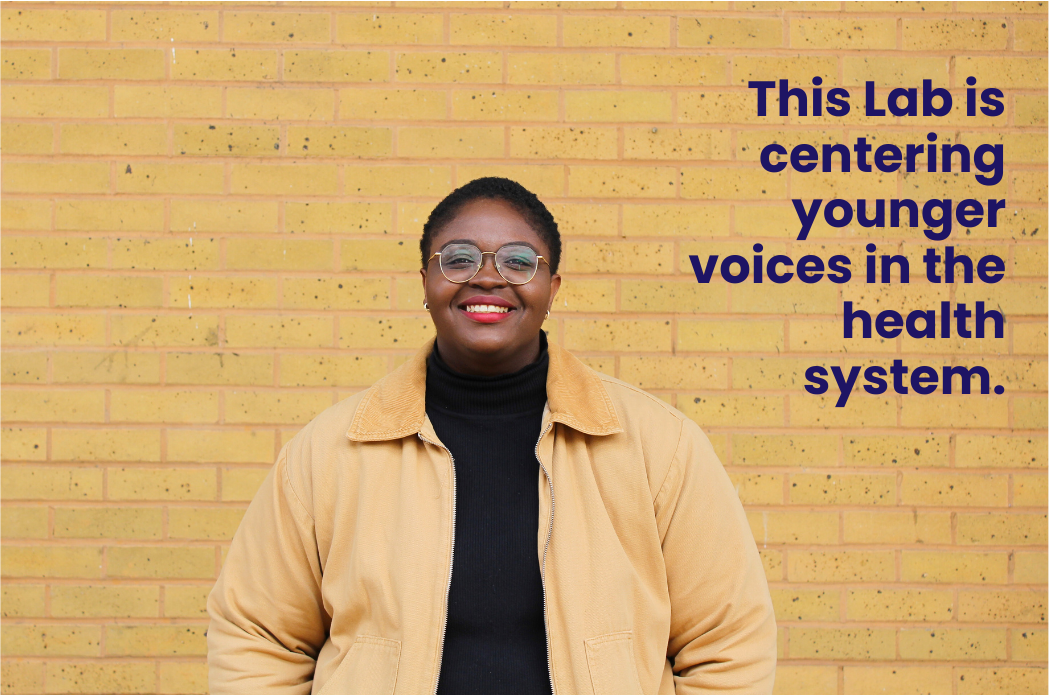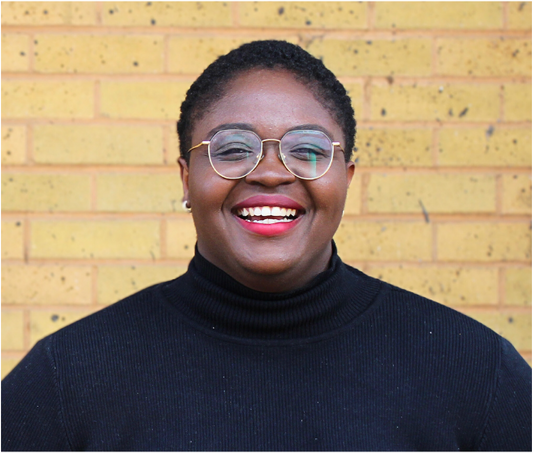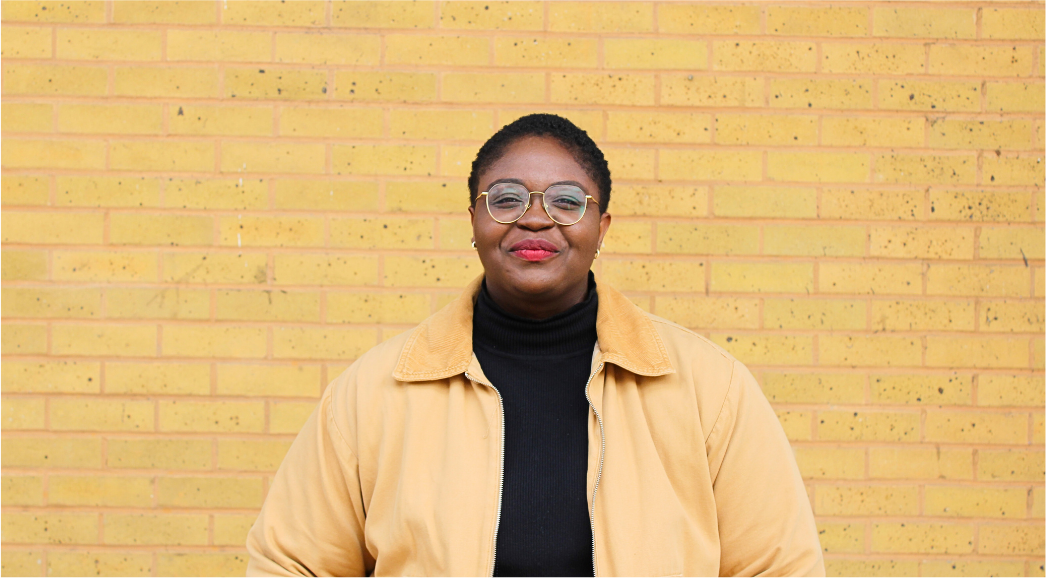
Fola Afolabi, Founder of the Youth Involvement and Engagement Lab, is working with stakeholders across the health system to centre young people and adults, promote better health outcomes and further health equity.
Fola Afolabi describes herself as a chameleon. “I try to not take life too seriously,” she says. “I love the gym. You know after a long day, you just-”, Fola laughs, miming a deadlift. “I like hot yoga as well. It helps me feel a bit more zen.” Fola settles on describing herself as being a “youth health champion”, which somewhat conceals the breadth of the impact she has already had towards centralising younger voices in public health research.
Fola holds positions as a public advisory board member at Guy’s and St Thomas’ NHS Foundation Trust, UCLPartners and the National Institute of Health and Care Excellence. Recently, she was appointed to the National Co-ordinating Centre for Public Engagement’s Inclusion Advisory Group on Race Equity. She was on the Board of the Birmingham and Lewisham African and Caribbean Health Inequalities Review focused on addressing health inequalities faced by Black people in Lewisham and Birmingham. At Impact on Urban Health, Fola was a Portfolio Manager and their Diversity Action Plan Co-led which involved leading their work on preventative health through systematically addressing the social determinants of health.
Fola started her social activism when she joined the Lewisham Young Mayor’s Advisors at the age of thirteen and represented Lewisham at the UK Youth Parliament. She has an undergraduate degree in Human, Political and Social Sciences and a Master’s degree in International, Social and Public Policy. She has also developed a podcast, Diversifying Health Research, one of three groundbreaking public engagement projects she developed at Imperial College London. Her experience is impressive, yet doesn’t convey the advances she has made for young people within these spaces.
At Imperial, for example, Fola secured seed funding to work with Action on Disability to develop a two-week work experience programme for disabled young people, and worked with another group of young people at a theatre company, Burnt Orange, to translate Covid-19 research reports into visual performances.
“I’m someone with my own lived experiences which I draw on,” she says. “Growing up in Nigeria, then moving to Lewisham when I was ten, I’ve experienced challenges in obtaining equitable access to healthcare services and come to understand how these obstacles are often exacerbated by the intersection of systemic racism, classism, and sexism. These experiences have make me feel like there is a pressing need for change to address health disparities, with a particular emphasis on implementing earlier preventative interventions.
I was incubating ideas to address urgent issues, but the organisations I worked for technically owned my intellectual property. These organisations have, therefore, benefited from me going above and beyond in creating various initiatives. After a while, I realised that I want more autonomy and flexibility to bring ideas to fruition and directly seek funding. So, I thought to myself, why don’t I establish my own organisation? It has been really rewarding so far, but more challenging than I initially anticipated.”
“By improving the involvement and engagement of local communities in public health, we can address health equity.”
With funding from the Challenge and Change Fund, Fola embarked on the journey of building an organisation from scratch; an organisation which is developing new approaches to engage young people in the health research space.
In the initial stages, she hosted two workshops with sixteen young people to discuss what their health priorities were and the information and resources they felt they needed to engage in health research. By creating a forum for this type of dialogue, Fola was able to gather a foundational understanding about the needs of young people and drew upon these to scope and define the programmatic areas of her organisation, the Youth Involvement and Engagement Lab.
“Some things came out really strongly,” she says. “It was evident that young people felt sidelined when it comes to their health. One of the participants felt that older people were treated more urgently because people think they’re more likely to die – those were their words. The way they articulated it was just so powerful and I resonated with what they shared in terms of feeling like their concerns are deprioritised when engaging with the health systems due to your age and how it intersects with other aspects of your identity. So there is a systemic challenge around making the health care system take a more upstream view and preventative approaches which challenge ageism, so younger people can be more centred and feel seen within the current system. We also have to acknowledge that the dominant systems are adult-led and largely have not been developed with the inclusion of younger people in mind, so they should be more inclusive.”
Following the workshops, Fola has taken steps to develop the organisational infrastructure of the Lab as a non-profit this year and it is a member of the National Council for Voluntary Organisations and Thirtyone:eight. The Lab has since begun programmatic delivery and is running projects in South and East London.
With the initial reflections from the workshops held with young people, Fola has engaged with key stakeholders to develop programmatic activities which align with the learnings.
“I want to go through a journey which centres younger people when it comes to public involvement and engagement in health, including health research,” explains Fola. “It is key for us to be involved throughout the research cycle. It’s important for us to be proactively included in those spaces so we can make decisions about how research is framed, which then impacts interventions and the success of its uptake.
It doesn’t feel like, as younger people, we’re centred in a lot of discussions. When you think about health or health inequalities, there is now a greater focus on health inequalities based on ‘race’ which is very important but it also needs to be accompanied by further discussion on how it intersects with other factors including age, particularly as it pertains to young people. The Lab aims to promote youth and racially minoritised-led engagement in health, including research, so we can improve health equity for young people.”
“My experiences have given me so much insight into the flaws in the system, how unrepresentative it is, and the unequal power dynamics which are being reinforced.”
Like all the Challenge and Change Partners, Fola’s work is a direct response to her own lived experience. She has continually observed that the health system is often unsuitable to adequately meet the needs of people who already experience inequality and discrimination.
“My experiences have given me so much insight into the flaws in the system, how unrepresentative it is, and the unequal power dynamics which are being reinforced. I know how system-wide issues have impacted my lived experiences. I think, as a result of these experiences, I am very conscious about how power operates in different spaces, and I am very intentional about challenging unequal power dynamics, promoting better practice and supporting equitable innovation.
And I want to have fun!”, adds Fola. “The current system can be very boring! Oftentimes, I find research is communicated in a very complicated way and despite my educational background, sometimes it is very inaccessible! I would love more researchers to think critically about inclusion and proactively work with local communities throughout the research journey, including dissemination.”
“I’m part of building a more joyful world where I can focus on thriving.”
Fola talks about her work with all the optimism and weariness of a person who is battling, successfully, to create change in a complex system. She, like many young leaders with lived experience, is juggling multiple obligations and navigating the same issues that she is trying to change.
“I think I also call myself a chameleon because navigating the multiple changing systems to thrive in this world involves having to flex. There are certain contexts I have been in which do not allow me to be authentically myself, which is a shame, and I code switch to be heard. However, it gets exhausting and ultimately means it is not truly an inclusive space. I think it was this recognition that made me want to start independent projects because it provides me with more autonomy about which spaces I can be in, and often allows for more authenticity and joy.
Through this work, I’m part of building a world where there is health equity because we have addressed the social determinants of health and created systems which understand people and equitably respond to their needs.
I’m part of building a more joyful world where I can focus on thriving not just for myself but for my communities.”
—
If you’d like to connect with Fola and the Youth Involvement and Engagement Lab, you can do so by emailing info@youthinvolvementlab.co.uk or visiting their website.
—
The Challenge and Change Fund is designed by young changemakers for young changemakers. It funds young people directly, supporting them to create the change they want to see. It prioritises young people who are emergent and have lived experience of the injustices they are trying to change, supporting youth led collectives, social enterprises and CICs across England. You can read more about Challenge and Change here.

